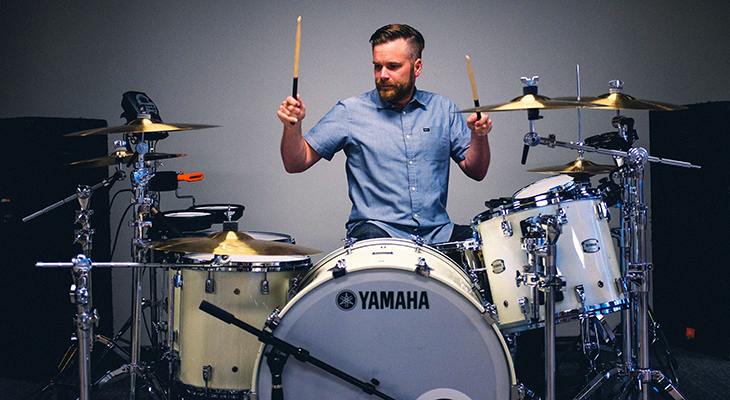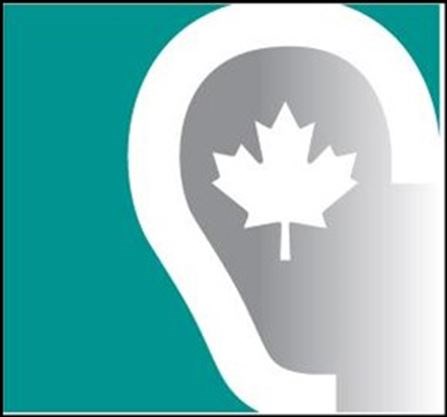Hearing Loss for Rock & Roll Boomers?
Did you know 1 out of every 10 people has a hearing problem? Over the age of 50, it’s 1 in 5.
Surveys are showing the “baby boomer generation” – 1940s to 1960s – from the “Rock & Roll era”, has damaged the hair cells in their cochlea.
 (Drummer Photo: NeONBRAND via Unsplash)
(Drummer Photo: NeONBRAND via Unsplash)
A hard of hearing individual usually wears a hearing aid and communicates verbally. The deaf use sign language as their primary communication. In the Hamilton, Ontario area (population close to 600,000), between 50,000 – 100,000 people wear hearing aids. Most lose their hearing gradually, but some suddenly (which is uncommon).
In the past, there wasn’t much help for people with hearing loss. As early as the 13th century, those with hearing loss were using hollowed out horns of animals such as cows and rams, as primitive hearing devices.
It wasn’t until the 18th century that the more “modern” ear trumpet was invented.
Today’s hearing aids are much more user friendly and are available in various sizes and colors. Some people prefer to wear aids that blend in with their hair and skin. Others enjoy wearing fun, vibrant reds, purples, and greens.
People wear glasses to see better…and people wearing hearing aids to hear better.
So…What is Hearing Loss?
You can tell that a person with a white cane or in a wheelchair has a disability. Being hard of hearing is an invisible disability. You can’t see it.
Hearing loss varies. Hard of hearing people do not hear more softly; they hear differently. Frequently, they hear distorted sound. Deafened persons do not hear anything at all.
Why Wear Hearing Aids?
We’ve learned that it’s important to wear your hearing aids all the time. If not, your brain becomes lazy from lack of use or stimulation.
One of the strongest reasons for wearing your hearing aids might be the recent studies that indicate unaided hearing loss contributes to dementia. Just as doing crossword puzzles help to stimulate brain activity, so does wearing your hearing aids.
Hearing is like every other part of the body – use it or lose it! – so wear your hearing aids all the time (not including bathing and sleeping of course).
What is Noise?
And how much noise is too much?
It is any unwanted sound and is the #1 cause of hearing loss. The higher the decibel level, the louder the noise.
The effects of noise on hearing vary among people…But any sound that is loud enough and lasts long enough can damage hearing and lead to hearing loss.
A sound’s loudness is measured in decibels (dB). Normal conversation is about 60dB, a lawn mower is about 90dB, and a loud rock concert is about 120dB.
How is Noise Harmful?
Noise may cause high blood pressure, faster heart rates, and may contribute to heart and circulatory disorders.
Side effects can include ear pain, headaches, hearing loss, and tinnitus.
How Can You Fight Noise Pollution?
- Politely ask to turn down music in restaurants, shops, even at home.
- Check your municipal noise by-laws.
- Wear hearing protection when using a lawn mower, leaf blower, snow blower, and for sporting events and concerts.
- Protective earmuffs or ear plugs are available at many sports stores.
So…How Do You Know If You Have a Hearing Loss?
There can be many possible causes of hearing loss. Besides aging, certain drugs, injury, viral infections during pregnancy (such as rubella), shingles, meningitis, diabetes*, and excessive noise exposure (from music and machinery).
You know you may have a hearing loss if you:
- Must turn the volume up on the TV.
- Think everyone is mumbling.
- Constantly ask people to repeat themselves.
- Sometimes can’t tell where the direction of sound is coming from.
*Specific reasons for deafness due to diabetes can be hard to determine, but may include high blood sugar damaging blood vessels throughout the body, including the ear; nerve damage to auditory nerves; etc.
What Can You Do About Your Hearing Loss?
Visit your family doctor, ENT or audiologist. If they recommend hearing aids, it will make a positive improvement in your life (and likely for those people around you). And remember, they will do you no good sitting in a drawer.
If your hearing loss becomes severe and hearing aids no longer help, you may be a candidate for a cochlear implant. A cochlear implant may be compared to a pacemaker in relation to the heart.
Helpful Hints for “We” Hard of Hearing
Keep the light on the face of the person speaking to you.
Closed captioning on TV is helpful.
Consider learning lip/speech reading at your local hearing loss support group.
 The broken EAR is the international symbol of the hard of hearing. If you see it at a place of worship, theatre or any public building, that means they will have assistive listening devices.
The broken EAR is the international symbol of the hard of hearing. If you see it at a place of worship, theatre or any public building, that means they will have assistive listening devices.
Above all, keep your sense of humor!
When You’re Speaking to Someone Who is Hard of Hearing
- Do not shout, speak clearly.
- If there is background noise, try and move to a quieter location and rephrase your comment.
The Canadian HARD of HEARING Association (CHHA) is a voice for hard of hearing Canadians. Our vision is a Canadian society that is respectful and fully accessible to people with hearing loss.
***This article is for general informational purposes only.***
****All text in this article, and photographs as noted above, are © Jacquie Reid / Hamilton Branch, Canadian HARD of HEARING Association. All rights reserved. Do not download or reproduce without written permission.****

